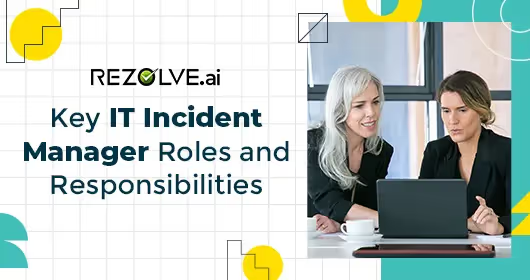ITIL defines incident management as important for maintaining IT services' reliability and efficiency. The IT incident manager plays a key role in this process by overseeing and coordinating efforts to minimize the impact of incidents on the organization and swiftly restore normal service.
For effective incident management, the manager must thoroughly know the ITIL framework and the specific IT services.
Solid communication and collaboration skills are also important, as the role involves close interactions with various stakeholders, including end-users, technical support teams, and management.
In this blog post, we will explore further the role of IT incident managers, discussing:
- Their position within an IT organization
- The key activities they undertake
- Important incident response roles and responsibilities
- Their essential skills
- Metrics for evaluating their performance
Where do Incident Managers Fit Within an IT Organization?
IT incident managers bridge the gap between technical support teams and business operations. Their strategic position ensures that incident impacts are minimized and normal operations are restored swiftly.
Key aspects of their position within the organization include:
1. Collaboration with the service desk
They work closely with the service desk, the initial point of contact for all IT issues, ensuring a streamlined incident reporting and response process.
2. Coordination across support levels
They coordinate with various technical support levels, from first-level support handling basic issues to advanced technical specialists tackling complex problems.
3. Liaison with IT operations management
They ensure that incident resolution aligns with broader IT operational goals and compliance standards.
Key Activities an IT Incident Manager Performs
The incident manager is tasked with important activities aiming to reduce the immediate effects of incidents and enhance IT services' long-term stability and performance. Such as:
1. Incident identification and recording
The incident manager is responsible for carefully documenting every incident as soon as it is identified. This involves capturing all relevant details to facilitate accurate analysis and assist in future incident prevention. Proper recording is important for tracking trends and patterns indicating underlying system vulnerabilities.
2. Initial classification and prioritization
After logging the incident, the incident manager classifies and prioritizes it based on established criteria that assess its impact and urgency. This step is important as it determines how resources are allocated and the order in which incidents are addressed, ensuring that the most disruptive issues are resolved first to minimize their impact on business operations.
3. Incident investigation and diagnosis
This activity involves a detailed investigation to pinpoint the root cause of an incident. The incident manager utilizes advanced diagnostic tools and collaborates with technical experts to analyze the incident thoroughly. Understanding the cause is vital for developing effective solutions and preventing recurrence.
4. Resolution and recovery
They coordinate the development and implementation of solutions to resolve the incident. This may involve software updates, hardware repairs, or configuration changes. The goal is to restore services to their normal operating levels as swiftly as possible, reducing downtime and associated costs.
5. Incident closure and evaluation
After resolving the incident, the IT incident manager ensures it is formally closed within the incident management system. They also conduct a comprehensive evaluation to verify that the resolution meets all service quality standards and addresses the end-user's needs. This step confirms the effectiveness of the incident response and maintains trust in IT services.
6. Continuous improvement
The incident manager analyzes data from resolved incidents to identify improvement opportunities within the incident management process. This includes updating response strategies, enhancing team training, and integrating new technologies. Continual refinement of practices helps prevent future incidents and improves the resilience of IT operations.
Understanding the Key Incident Management Response Roles and Responsibilities
It's important to prevent overlapping efforts and overlooked tasks during an incident. This clarity helps avoid confusion and improves the team's efficiency in managing incidents. Here are a few key response roles and responsibilities.
1. Identifying and reporting incidents
Role: Incident manager
They are responsible for the early detection of IT disruptions. Using advanced monitoring tools, they swiftly identify the origins and scope of incidents. Upon detection, they undertake a thorough analysis to understand the underlying causes and implications.
This important early step ensures that incidents are not only logged with detailed classifications such as incident type, affected systems, and stakeholders impacted but also assessed to determine the necessity and extent of further actions. Their responsibilities include deciding on immediate containment measures and initiating a deeper investigation.
2. Prioritization of incidents
Role: Incident manager
They prioritize incidents based on a structured criteria matrix involving their impact on business operations, the urgency of the response needed, and resource availability. They strategically categorize incidents to ensure that those with the potential to cause significant disruption or entail severe consequences are addressed first.
This prioritization is vital for effective resource allocation. It ensures that the most critical incidents receive immediate attention to minimize the overall impact on the organization.
3. Identification of potential problems
Role: Problem management manager
They focus on the long-term stability of IT systems by analyzing incident logs and trends over time. Their role involves strategically evaluating repeated incidents and identifying patterns that indicate deeper systemic issues. Through proactive analysis, they develop insights that inform preventive measures, reducing the likelihood of future disruptions. Their work is critical in moving from reactive incident handling to a proactive stance on organizational IT health, improving system reliability and performance.
4. Managing incidents
Role: Incident manager
They coordinate the multifaceted response efforts from the onset of an incident to its resolution. They act as central communication points, coordinating across technical teams, management, and other organizational departments. Their role is important in orchestrating the deployment of IT resources, applying incident management protocols, and ensuring that all actions taken align with best practices aimed at swift and effective resolution. They also monitor the incident's progression and adjust strategies to address evolving challenges.
Using Rezolve.ai's Gen AI-based ITSM platform, incident managers can greatly improve their coordination and handling of incident responses. The platform's AI-driven automation, including the GenAI SideKick, fits smoothly into your existing ticketing and support systems, boosting incident management efficiency.
5. Investigating incidents
Role: 1st level technical support and IT team lead
The investigative role involves detailed analysis performed by 1st level support and IT team leads. They delve into the technical specifics of each incident to uncover root causes. This in-depth investigation is essential for resolving the immediate issue and gathering insights to prevent recurrence.
Their findings are often important in refining IT processes and enhancing security measures, contributing to stronger defenses against similar future incidents. Rezolve.ai helps IT support teams work more effectively, improving the workplace experience by ensuring faster service restoration and better operational stability.
6. Providing updates on incidents
Role: Communications manager
They play a crucial role in maintaining organizational transparency during incident management. They ensure consistent updates are communicated to all stakeholders, detailing progress, setbacks, and resolution timelines. Their effective communication aids in managing expectations and maintaining trust during potentially disruptive events.
Additionally, they coordinate feedback loops, which are essential for continuous improvement in incident handling processes.
7. Managing information flow
Role: Incident manager
A key part of the incident manager's role is ensuring that all incident response documentation is comprehensive and accessible. They facilitate the flow of information across the organization, ensuring that lessons learned are shared widely and integrated into future operational strategies. This documentation supports a continuous improvement culture, helping refine response strategies and build organizational resilience against future incidents.
Skills to Look for When Hiring Incident Managers
When hiring incident managers, it's important to identify specific skills important for effective incident response and management. Such as:
1. Technical skills
A deep understanding of IT infrastructure, systems, and applications is essential. Incident managers should possess proficiency in network protocols, server configurations, operating systems, and relevant IT tools for monitoring and troubleshooting.
2. Communication
Incident managers must excel in verbal and written communication, which is important when interacting with end-users, technical teams, and management stakeholders.
For instance, they must explain a server outage's implications on customer services to executives in plain language. This skill ensures everyone involved is on the same page during an incident, reducing errors and accelerating recovery.
3. Problem-solving
Incident managers often face situations where standard procedures may not apply. Problem-solving solid abilities allow them to innovate and adapt strategies on the fly, which is crucial for resolving incidents that could otherwise escalate in severity.
4. Eye for detail
Minor discrepancies in data backup processes could lead to significant data loss. Right documentation ensures accurate incident tracking and compliance with industry standards (e.g., ITIL or ISO 20000).
An eye for detail lets the IT incident manager notice these discrepancies early. Addressing these minute errors prevents larger data integrity issues that could hinder the organization.
5. Methodical mind
Complex, multi-system failures often require coordinated recovery efforts. A methodical mind helps the incident manager systematically assess the impact across systems, prioritize recovery actions based on criticality, and implement a step-by-step restoration plan that efficiently brings systems back online.
6. Ability to stay calm under pressure
Keeping a cool head during high-stress incidents helps to maintain order and focus within the team. This ability is crucial as it influences decision-making, ensuring rational and effective situation management.
How to Measure the Incident Manager's Performance
The following are KPIs and metrics that evaluate an incident manager's capabilities:
1. Incident response time
This measures the speed at which an incident manager reacts from when an incident is reported or detected to when the initial response is taken. Quick response times are important as they directly influence the containment and ease of the incident's impact, showcasing the manager's efficiency in mobilizing resources and initiating the incident-handling process.
2. Incident resolution time
This indicator tracks the total time it takes to resolve an incident from its onset. Effective incident managers are characterized by their ability to resolve incidents rapidly, ensure minimal service disruption and restore normal operations promptly. Their ability to apply appropriate solutions and manage resources effectively reflects this capability.
3. Number of incidents resolved within SLA
Evaluating the percentage of incidents resolved within the agreed-upon service level agreements provides insight into how well an incident manager maintains compliance with defined service standards. High performance indicates the manager's consistent ability to manage incidents within the expected timelines, which is vital for maintaining trust and satisfaction among clients and stakeholders.
4. Incident escalation rate
Monitoring the rate at which incidents are escalated to higher levels of support helps assess the incident manager's capability to handle issues independently. A lower escalation rate suggests proficiency in resolving incidents initially, indicating a solid grasp of the technical and management aspects required for effective incident resolution.
5. Repeat incident rate
The frequency of recurring incidents of the same type is a critical measure of an incident manager's ability to address the root causes effectively. A low rate of repeat incidents signifies the successful implementation of durable solutions and preventive measures, thus enhancing system reliability and performance over time.
6. Change success rate
This KPI measures the effectiveness of changes implemented to resolve incidents, ensuring they do not cause subsequent issues. A high change success rate demonstrates the incident manager's adeptness in executing well-planned and thoroughly tested changes, minimizing the risk of additional problems and reinforcing the stability of IT systems.
7. Mean time between failures (MTBF)
Although more general, this metric helps gauge the overall stability of the IT infrastructure under the incident manager's purview. Improvements in MTBF can indicate effective incident management and resolution, contributing to longer periods of uninterrupted system performance.
How Automation with Rezolve.ai's GenAI ITSM Platforms Can Streamline the Incident Management
A skilled IT incident manager greatly benefits an organization's IT services. They minimize downtime and increase service availability. They also speed up incident response and resolution. By addressing recurring incidents, they improve system reliability. Additionally, they boost communication and collaboration within the IT department and with other stakeholders.
Integrating Rezolve.ai's GenAI ITSM platform can further streamline these processes, elevating the efficiency and dependability of your IT operations to support your organization's success. To get started, book a free demo with our experts today!
FAQs
What is the role of an incident management team?
The incident management team ensures quick and effective responses to unexpected events or disruptions. Their main job is to restore normal service operations as swiftly as possible, minimizing impact on business operations and maintaining quality service levels. They coordinate the efforts to solve the incident and ensure everything gets back on track.
What is the role of an incident manager?
An incident manager leads the charge for handling and resolving incidents. They're the point person who organizes all aspects of the response effort, from identifying and analyzing the incident to resolving it efficiently. Their goal is to keep downtime to a minimum and ensure that the incident causes the least possible disturbance to the organization's operations.
What is an incident manager also called?
An incident manager might also be referred to as an Incident Response Coordinator. This title highlights their role in coordinating the response to ensure incidents are appropriately managed and resolved quickly.
What are incident management skills?
Effective incident management requires a mix of technical and soft skills. Key skills include problem-solving to find solutions quickly, communication to clearly instruct and inform team members and stakeholders, critical thinking for analyzing incidents and their impacts, and stress management to maintain composure in high-pressure situations. These skills help ensure that incidents are handled efficiently and with minimal disruption.





.webp)




.jpg)

.png)








.png)